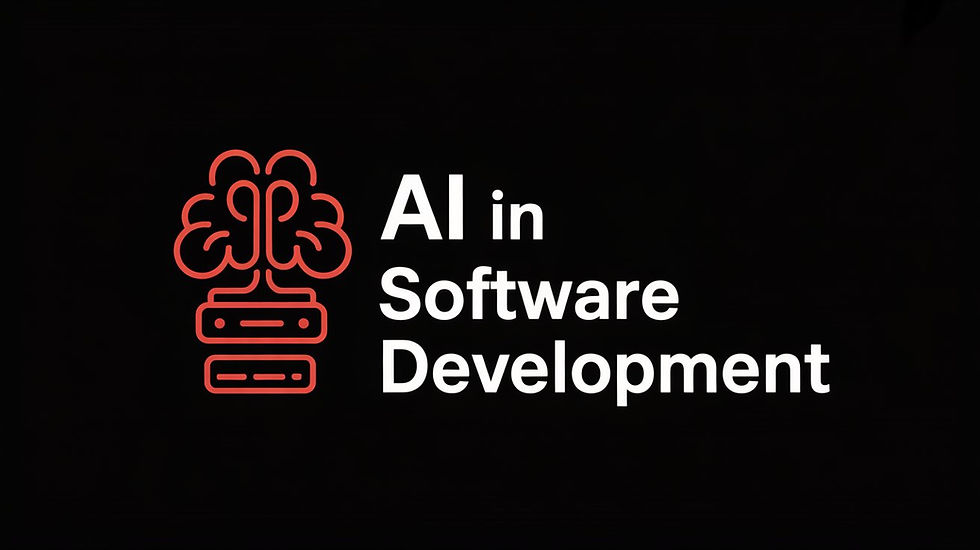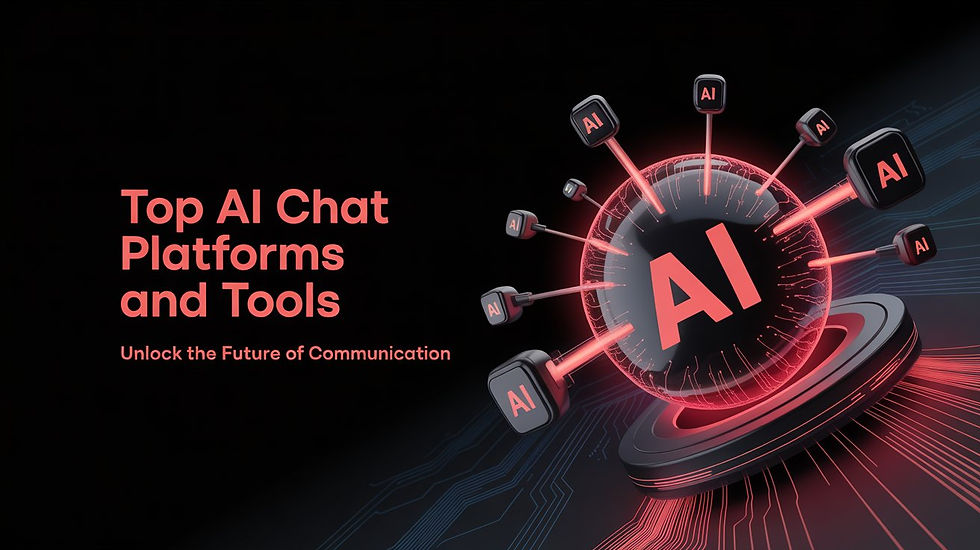The Ultimate Guide to AI Business Automation Tools (2025)
- pengarhehe
- Jul 27
- 7 min read

AI Business Automation Tools
Artificial intelligence (AI) is transforming businesses across all industries. Organizations that invest deeply in AI report tangible gains: one survey found 67% of AI decision-makers plan to boost their generative AI spend this year. In marketing specifically, over half of professionals use AI to optimize content (including email campaigns and SEO), and 73% say AI is crucial for personalizing customer experiences. Meanwhile, industry analysts note that 92% of companies intend to invest in AI software and 82% expect AI will transform their business in the next five years. These trends make it clear that AI automation isn’t just hype – it’s rapidly becoming a business imperative.
Why AI Automation Matters for Businesses
AI-driven automation offers major benefits for modern organizations. For example, research indicates companies deeply leveraging AI see sales ROI jump by 10–20% on average. This is because AI automates repetitive tasks and mines data for insights, freeing teams to focus on strategy. Key advantages include:
Higher Productivity and ROI: AI-powered systems can handle tasks around the clock, reducing manual errors and costs. McKinsey reports that marketing and sales organizations see double-digit ROI gains (10–20% on average) when they integrate AI deeply into their processes.
Personalization at Scale: AI makes it possible to tailor messages and offers to individual customers. In fact, 73% of marketers say AI helps them create personalized experiences. By automating personalization (in emails, ads, product recommendations, etc.), companies can boost engagement and loyalty without manual effort.
Cost Efficiency: Automating back-end processes (like data entry, lead scoring, or reporting) with AI cuts operating costs. A Forrester study points out that generative AI empowers businesses to produce high-quality content and services at scale while freeing up staff for higher-value work.
Faster Insights and Decision-Making: AI tools rapidly analyze vast datasets and surface actionable insights. For example, AI analytics can identify trends or anomalies faster than human teams, enabling quicker, data-driven business decisions.
By integrating AI tools for tasks like marketing, customer service, and analytics, businesses can work smarter and adapt more quickly. As Srividya Sridharan of Forrester notes, generative AI has shifted from “nice-to-have” to a competitive necessity.
Key Areas of AI Automation
AI can be applied across nearly every part of a business. Common domains include:
Marketing and Sales: Automate campaign creation, lead generation, customer segmentation, and sales outreach.
Customer Service: Deploy AI chatbots and virtual assistants to answer questions instantly and route complex issues to humans. In fact, Forrester highlights that AI chatbots like ChatGPT and IBM Watson can deliver timely, accurate answers to customer inquiries.
Content Creation: Use AI to generate or optimize content (emails, blog posts, social media copy, video scripts) quickly.
Analytics & Reporting: Leverage AI for data analysis, forecasting, and automated report generation, saving hours of manual work.
Operations & Workflow: Connect apps and automate workflows (for example, auto-generating reports, syncing data across systems, or triggering actions).
The “AI agents” landscape shows how diverse AI tools have become, spanning categories like Marketing, Finance, Customer Service, and more. Each category of AI agent – from marketing assistants to virtual sales agents – helps companies automate and improve specific business functions. By adopting AI platforms in these areas, companies create an AI-powered “virtual workforce” to augment human teamsi.

Top AI Automation Tools for Marketing and Business
Below are leading AI tools that businesses use to automate marketing, sales, support, and more. We’ve grouped them by function, with our affiliate-recommended solutions integrated naturally.
Email Marketing Automation Tools
Modern email platforms now include AI-driven features for segmentation, personalization, and content. For example, ActiveCampaign offers AI tools that predict customer behavior and automate personalized email sequences. Similarly, AWeber has AI-powered copy assistants that generate subject lines and content tailored to your audience. GetResponse also leverages AI for predictive analytics, helping optimize send times and improve open rates. Using these platforms, businesses can set up fully automated email workflows (welcome series, cart abandon reminders, newsletters, etc.) with minimal manual effort. For example, an AI-driven email tool might automatically segment new leads by interest and trigger targeted campaigns accordingly.
AI Content Creation & Copywriting Tools
Producing blog posts, ad copy, and social media content can be time-consuming. AI writing assistants streamline this by generating drafts and ideas. Platforms like Writesonic and Scalenut use advanced AI models to draft articles, emails, and ad copy in seconds. For specialized use, CopySpace focuses on improving SEO content, while VeryGoodCopy delivers AI-generated email templates, sales pages, and video scripts optimized for engagement. These tools let teams quickly produce high-quality marketing materials and then refine them, massively accelerating content creation workflows.
Chatbots & Customer Engagement
AI chatbots can handle routine customer questions and even qualify leads. Services like LiveChat offer AI chat widgets that engage website visitors 24/7, answering FAQs instantly and escalating complex issues to human agents. Chatbot.com provides a platform to build AI-driven conversational bots for sales and support. These chatbots use natural language processing to understand queries, which improves customer satisfaction and frees staff to focus on tricky problems. According to industry research, high-performing service teams are over twice as likely to use AI chatbots, allowing more agents to tackle complex tasks.
SEO & Analytics Tools
AI isn’t just for content creation; it also enhances SEO and data analysis. SERanking is an all-in-one SEO platform that incorporates AI for keyword research, rank tracking, and on-page SEO audits. It can automatically analyze competitors and suggest optimization strategies. Meanwhile, AI models like ChatGPT can brainstorm keyword ideas or improve meta descriptions. Combining SERanking’s data dashboards with AI insights helps marketing teams refine campaigns faster and stay ahead in search rankings.
Workflow Integration & Automation Platforms
Connecting and automating tools is easier with integration platforms. Make (formerly Integromat) is a powerful no-code automation platform where you can link apps (CRMs, email, Slack, etc.) and build workflows. For example, Make can trigger an AI task whenever a new lead enters your CRM (e.g. auto-sending a personalized follow-up email). Similarly, systeme.io is an all-in-one marketing platform that uses AI to optimize sales funnels and email sequences without needing separate tools. By using these platforms, businesses automate cross-app processes – such as syncing customer data or auto-generating reports – saving hours of manual work each week.
Video & Social Media Marketing Tools
AI also boosts social and video marketing. For YouTube creators, TubeBuddy is an AI-powered browser plugin that automatically suggests SEO-friendly tags, thumbnails, and posting times for each video. It can even schedule uploads and track channel analytics. On social media, many marketing platforms (not listed here) use AI for scheduling and analyzing posts. Integrating TubeBuddy and similar AI tools streamlines video production workflows and helps businesses grow their online audience efficiently.

Best Practices for Implementing AI
To succeed with AI automation, businesses should follow best practices:
Define Clear Objectives: Start with specific goals (e.g. increase email open rates, reduce support tickets). This ensures any AI tool is aligned with business needs.
Ensure Quality Data: AI relies on good data. Clean and well-structured customer and sales data is crucial for accurate predictions and insights.
Start Small and Scale: Begin by automating a few key tasks (like an email follow-up or a chatbot for FAQs), then expand as you see success.
Train Your Team: Equip staff with AI literacy. Teams that are trained in AI tools report much higher success in deployment.
Monitor and Optimize: Regularly review AI outcomes. Use analytics to tweak automated campaigns and improve performance over time.
Maintain Human Oversight: Always include human review, especially for customer-facing AI. This ensures brand voice consistency and ethical use.
By integrating AI tools thoughtfully and following these guidelines, companies can overcome implementation challenges and fully realize AI’s value. Research shows firms that invest in data, talent, and clear strategies see up to 1.5× higher growth by leveraging AI effectively.
Future Trends in AI Automation
Looking ahead, AI is set to become even more powerful in 2025 and beyond. McKinsey projects that generative AI could contribute up to $2.6–4.4 trillion annually across industries. Gartner predicts “Agentic AI” as a key trend: autonomous AI systems that plan and execute tasks as digital assistants or “virtual employees”. In practice, this means AI agents that can autonomously manage entire workflows (e.g. handling customer inquiries end-to-end or dynamically optimizing ad campaigns). With each passing year, AI tools are becoming more capable and easier to use. By staying up-to-date with these trends and adopting the right platforms, businesses can ensure they remain competitive and innovative.
Frequently Asked Questions
What is AI business automation?
AI business automation refers to using artificial intelligence to automate routine business processes. This can include anything from automated email campaigns and data analysis to AI-powered chatbots for customer support. The goal is to reduce manual effort, improve accuracy, and allow employees to focus on creative or strategic tasks.
How can businesses use AI marketing tools?
Businesses use AI marketing tools to create personalized campaigns, segment customers, generate content, and analyze performance. For example, AI can automatically draft marketing emails, recommend products, or schedule social posts at optimal times. Tools like ActiveCampaign and GetResponse automate email campaigns, while chatbots engage website visitors – all making marketing more efficient and effective.
What are some popular AI email marketing tools?
Popular AI email tools include ActiveCampaign, AWeber, and GetResponse. These platforms offer AI-driven features such as subject-line generators, predictive send-time optimization, and automated segmentation. They help small businesses and enterprises alike to send tailored email campaigns without manual effort. (See our AI Email Marketing guide for details.)
How does an AI chatbot work for customer service?
An AI chatbot uses natural language processing (NLP) to understand customer messages and provide relevant responses. Chatbots can answer common queries instantly, capture lead information, and even connect the customer to a human agent if needed. Advanced chatbots like those built with Chatbot.com or LiveChat continuously learn from interactions to improve accuracy and handle more complex requests over time.
Why should small businesses care about AI automation?
AI automation levels the playing field for small businesses by reducing costs and increasing efficiency. With AI tools, a small team can automate email newsletters, social media ads, customer support and data analysis – tasks that used to require many staff hours. This means even startups can run sophisticated marketing and support strategies. Plus, AI-driven insights help make smarter decisions, so small businesses can compete with larger firms.
Are AI automation tools easy to implement?
Many modern AI tools are designed for non-technical users, with drag-and-drop interfaces and integrations into familiar platforms (like CRMs, email services, and website builders). While no tool is completely “set and forget”, most businesses can start using basic AI features quickly. The key is to start with clear goals and quality data. Over time, as the team becomes comfortable, companies can gradually implement more advanced automations.






Comments